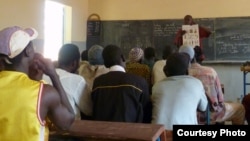Raising voter expectations may raise the price of buying a vote in a developing democracy.
It's not a perfect solution to imperfect government. But it's one way to measure what happens when you teach voters what their elected officials are supposed to be doing.
Politicians can get away with poor performance in a developing democracy like Mali because voters don't know what to expect from them, according to new research.
Civics education can lead voters to demand more, the study found, although it's expensive and time consuming.
Democracy in a subsistence society
Mali scores near the bottom of the human development index. Poverty rates are very high and literacy rates very low.
But it has been a fairly well-regarded democracy for most of the last two decades. Watchdog group Freedom House gave the country high marks until a coup in 2012.
Texas A&M University political science professor Jessica Gottlieb wondered how well democracy was really functioning in rural Mali, where most people are subsistence farmers with little access to media.
"Are [people] informed about what their governments are doing?" she asked. "Are they able to play the role of a democratic citizen ... which is, sanctioning their leaders for bad behavior?"
The government was decentralized in the late 1990s, putting local officials in charge of basic services like water supplies and health care, as well as the budgets to provide them. But very few people knew that. And local officials had little incentive to tell them.
"It for sure would be in the locally elected officials' interest to keep those expectations low so they could continue to be elected without doing much," she said.
So in 2011, working with the Malian government and local civil society groups, she put together a course to teach rural villagers the responsibilities of different levels of government. They compared how the local government was performing compared to others in the region. And they told people how much the local government received to provide services.
Those figures surprised people, she said. "Oftentimes they thought the local government didn't have any money to spend on these things because they didn't see many results."
The price of a vote
A few months later, researchers surveyed people in villages who received the courses and those who didn't. They asked people questions about a hypothetical election.
Although three-quarters of villagers said an inferior candidate could not buy their votes, one-quarter could be bought. But the price of their votes went from about $7 in villages that did not get the course to around $9 in those that did.
"For the more than half of rural Malians living on less than a dollar a day, this is not an insignificant sum," Gottlieb wrote in the study, published in the American Journal of Political Science.
Also, she found that people challenged elected officials about 50 percent more often in town hall meetings in these villages, from an average of four challenges per meeting in villages without the course to six in those with it.
They also found that in villages that received the civics course, people were more likely to choose a candidate who spends on public services over one who does personal favors. And they were more likely to vote based on the official's performance rather than kinship or the chief's endorsement.
The civics course is not the first to teach people in developing countries about their government's responsibilities. But "this study gives you much more credible evidence that in fact it does work," said Abhijit Banerjee, who studies the economics of poverty at the Massachusetts Institute of Technology. He was not involved with this research.
Less transparency
One problem with the program, said Gottlieb, is that it might be hard to do on a large scale. Instructors spent several days in each village. That's expensive.
"I don't know that the government has incentives to do this themselves," she added. "Donors might. But it requires a big push."
But there's another downside. When voters demanded more, politicians appeared less willing to answer to them. In villages where the course was taught, leaders held fewer public meetings in the following months compared to those that did not receive it. And candidates were less likely to campaign on a platform of transparency.
"That would make some sense if [elected officials] are misbehaving," Gottlieb said.
Banerjee saw similar rebound effects in a study in India. After an anti-corruption campaign, "some of the really bad guys don't run anymore. ... Instead of running, they put up their daughter or nephew or somebody, so they look like a new face at least. They try to fool the voter."
Study: Mali Voters Don't Know What to Expect From Politicians




